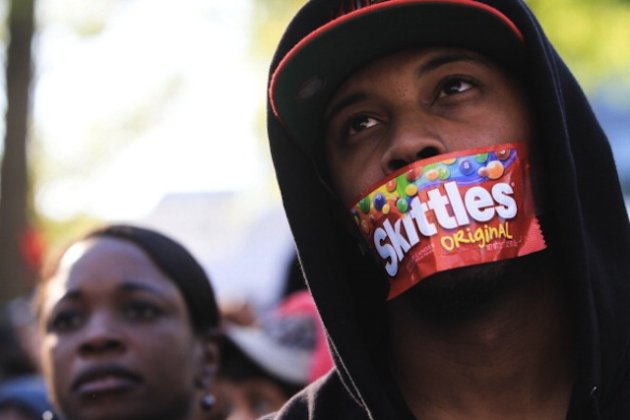 College student Jajuan Kelley covers his mouth with a Skittles wrapper as he rallies against stand your ground??
College student Jajuan Kelley covers his mouth with a Skittles wrapper as he rallies against stand your ground??
One year after 17-year-old Trayvon Martin was shot and killed by an armed neighborhood watchman, setting off a national debate about race and gun laws, the campaign to change state self-defense laws in Martin's name has petered out.
George Zimmerman, the neighborhood watch volunteer facing second-degree murder charges, said he shot Martin in self defense last Feb. 25 after he decided to follow him in the Sanford, Fla., gated community because Martin looked suspicious. Zimmerman called the police and then approached Martin, and they ended up in a physical fight. Zimmerman, saying he feared for his life, then shot Martin. He was not charged with a crime for several weeks, and his defense attorneys argue he's immune from prosecution under Florida's "stand your ground" law.
The incident led immediately to scrutiny of the law, which is on the books of 20 states in various forms. Basically, "stand your ground" says that people can use lethal force against an attacker without first attempting to retreat if they have reason to fear for their lives. Most states already allowed people to defend themselves in this way if they're attacked at home, but "stand your ground" went a step further to cover all public places.
A Tampa Bay Times analysis of 200 "stand your ground" cases in Florida?the law was adopted there in 2005?found that the law has been inconsistently applied, with one man escaping homicide prosecution even though he left an altercation to get his gun from his car, returned, and then shot the attacker.
After the Martin shooting and subsequent uproar, a coalition of civil rights groups and New York City Mayor Michael Bloomberg, the nation's highest-profile gun control advocate, started a campaign, called "Second Chance on Shoot First," to encourage the repeal of these laws. Soon after, Florida Gov. Rick Scott, a Republican, appointed a task force to study the law. Meanwhile, lawmakers in at least five states with "stand your ground" laws introduced legislation to alter or repeal their laws.
But not much has happened since then on the state level. And last Friday, the Florida task force released its final recommendations on the law, concluding that it works and should not be repealed. (The task force did recommend that prosecutors and law enforcement officers should receive increased training on the law to make sure it is applied consistently.)
In addition, none of the bills to repeal or change "stand your ground" in other states passed.
However, the conversation started by Martin's death may have served to stop state and federal legislators from passing more permissive gun laws that were in the works, says Adam Winkler, a constitutional law expert at UCLA. For example, a federal bill to allow people with concealed weapons to take them to other states that allow concealed carry died out after passing in the House.
"Trayvon Martin really stalled the move for more permissive gun laws," Winkler said. "Newtown ended it."
Since the Dec. 14 mass shooting in Newtown, Conn., Bloomberg and other high-profile gun control advocates have moved away from concealed carry and self-defense issues, and instead focused on encouraging specific reforms on the national level. Lawmakers are focusing on closing loopholes that allow some to avoid background checks before purchasing a weapon, banning high-capacity magazines, and banning some semi-automatic weapons.
Allie L. Braswell, the president and CEO of the Central Florida Urban League, which has worked to encourage the repeal of "stand your ground," said he was "disappointed" that the task force did not release stronger recommendations.
"This law gives people more leeway than I had on the battlefield as a United States Marine," Braswell, a veteran of the Gulf War, said. "When I was engaged in Iraq ... we could not fire until fired upon."
He acknowledged that the issue of repealing "stand your ground" has faded into the background.
"I think it's lost some of its support, unfortunately," Braswell said.
A judge will decide whether Zimmerman is immune from prosecution under "stand your ground" at a special hearing April 22.
st. joseph puerto rico primary manning peyton florida state meghan mccain wilson chandler
No comments:
Post a Comment
Note: Only a member of this blog may post a comment.